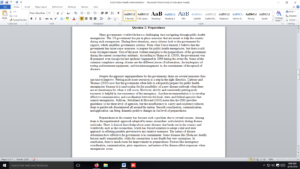Public Health Administration
Instructions: Please answer using your own words in a minimum of 400, maximum 500 words PER QUESTION SINGLE spaced. Referenced with two (3) peer-reviewed journal articles or qualified text publish within the past five years and follow APA Manual 6th or 7th editions scholarly writing guidelines. When writing replies, please provide your experiences, new ideas, add probing questions and new literature on the topic to enhance the learning opportunity.
HCAD 630 Discussion Topic – Week 9
Instructions: Please answer using your own words in a minimum of 400, maximum 500 words PER QUESTION SINGLE spaced. Referenced with two (3) peer-reviewed journal articles or qualified text publish within the past five years and follow APA Manual 6th or 7th editions scholarly writing guidelines. When writing replies, please provide your experiences, new ideas, add probing questions and new literature on the topic to enhance the learning opportunity.
9.1. Food Safety and Foodborne Illness
Who controls the response to foodborne disease outbreaks? What are some of the local, state, and federal agencies that help protect our food? How do they accomplish this task? Select an incident within the past couple of years that created a public health outbreak.
Describe the response. What went right? What worked less than optimally? What agencies and organizations participated? Who was “in charge”?
Based on what you have learned, how would you assess the nation’s preparedness posture? What would you recommend? Why is this such a problem? Cite the incident and evidence for your recommendations.
9.3. Water & Waste Water
Think about water. Think about how it is tied in with waste and vector borne diseases. Humans have been using water as a way for disposing waste for centuries! Vector-borne diseases account for more than 17% of all infectious diseases, causing more than 1 million deaths annually. We take water so much for granted yet it is many times the source of many public health issues. Give an example of why we need to be concerned with vector-borne diseases and what progress we are making (or not.)
Answer preview
Despite the apparent unpreparedness by the government, there are several measures they can take to improve. Putting aside more resources is a step in the right direction. Carbone and Thomas (2018) note that the government often fails to adequately prepare for public health emergencies because it is hard to plan for the possibility of a new disease outbreak when there are no timestamps for when it will occur. However, slowly and consistently putting aside resources is helpful in the occurrence of the emergency. Another recommendation is to develop effective communication and coordination between the local, state, and federal agencies that control emergencies. Sullivan, Strickland & Howard (2020) notes that the CDC provides guidelines to the three-level of agencies, but the insufficiency in clarity and coherency reduces them to patchwork disseminated all around the nation. Smooth coordination, communication, and application can bring dramatic positive changes in the level of preparedness.
[2655 Words]

Public Health Administration

